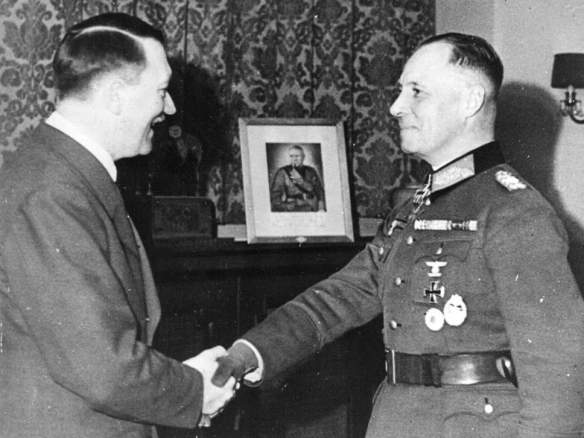
In the document printed below, Rommel confronted Hitler with an ultimatum. He did so through proper channels, that is to say, through his superior, Field Marshal Günther von Kluge, Supreme Commander West. Kluge sent the ultimatum to Hitler and addressed to the Führer his own assessment of the situation, which fully supported and partially repeated that of Rommel.
COPY3
The Commander-in-Chief of Army Group B
H.Q., 15.7.44
Considerations of the Situation
The situation on the Normandy front grows more difficult daily and is approaching a severe crisis.
Due to the severity of the fighting, the enemy’s enormous use of material, above all artillery and tanks, and the effect of the enemy’s unrestricted command of the air over the battle area, our own casualties are so high that the fighting strength of the divisions is rapidly diminishing. Replacements from home come only very sparingly and, with the difficult transport situation, take weeks to reach the front. As against casualties of around 97,000 men (including 2,360 officers) – that is, on average 2,500 to 3,000 men per day – replacements to date number 10,000 (of which around 6,000 have actually arrived).
Material losses the deployed troops have incurred are also uncommonly large and could be replaced up to now on only a very small scale, for example, so far 17 tanks as against losses of 225.
The newly arrived infantry divisions are raw, unused to battle, and – with their small establishment of artillery, armour-piercing guns, and close-combat anti-tank guns – not in a state, after hours of barrage and heavy bombing, to successfully repulse major enemy offensives for any length of time. As the fighting has shown, with this use of material by the enemy, even the bravest troops will be smashed piece by piece, losing men, arms, and territory.
Through the destruction of the railway system and the threat of the enemy air force to roads and tracks up to 150 km behind the front, supply conditions are so difficult that only the barest essentials can be brought up, and it is necessary to exercise the greatest economy in everything, above all in artillery and mortar ammunition. These conditions are not likely to improve, as enemy action is steadily reducing available transport capacities, and enemy activity in the air is likely to become more effective as the many airfields in the bridgehead area are taken into use.
No new forces of any consequence can be brought into the Normandy front without weakening the front of the 15th Army [on the Channel] or the Mediterranean front in southern France. The front of the 7th Army alone urgently needs 2 fresh divisions, since the troops there are exhausted.
On the enemy’s side, fresh forces and quantities of war materiel flow to the front every day. The enemy supplies are undisturbed by our air force. Enemy pressure is becoming steadily stronger.
In these circumstances, we must expect that the enemy in the foreseeable future will succeed in breaking through our thin front, especially that of the 7th Army, and thrust deep into France. I may refer to the enclosed reports of the 7th Army and the 2nd Paratrooper Corps. Apart from the Panzer Group West’s sector reserves, which for the time being are tied down by the fighting on their own front and, due to the enemy’s command in the air, can only move by night, no mobile reserves are available at 7th Army for defence against such a break-through. Action by our air force will have, as before, very little effect.
The troops are everywhere fighting heroically, but the uneven struggle is nearing its end. In my opinion, it is necessary to draw conclusions from this situation. As Army Group Commander-in-Chief I feel myself in duty bound to speak plainly on this point.
[F.d.R.d.A.]
signed Rommel
General Field Marshal.